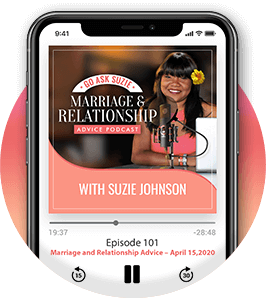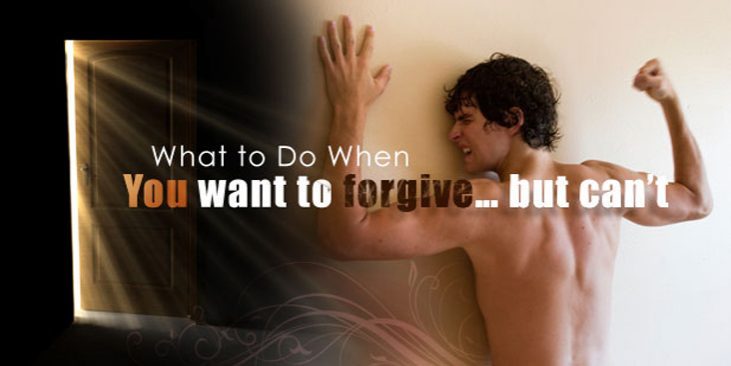![]() Suzie, I feel like I really want to forgive my fiancée, but no matter how hard I try, I can’t seem to forgive her. I just can’t get past what she did. After all, she lied to my face over and over again. I would like to continue our relationship, but every time I think about what she did, I just get angry all over again. I know I need to forgive her so that we can move on, but no matter how hard I try, I just can’t seem to let it go. Can you help? — Steven A.
Suzie, I feel like I really want to forgive my fiancée, but no matter how hard I try, I can’t seem to forgive her. I just can’t get past what she did. After all, she lied to my face over and over again. I would like to continue our relationship, but every time I think about what she did, I just get angry all over again. I know I need to forgive her so that we can move on, but no matter how hard I try, I just can’t seem to let it go. Can you help? — Steven A.
![]() One has to go.
One has to go.
If you want the relationship to continue, then you can’t continue to punish her. If you continue to punish her, then you can’t expect the relationship to continue.
The real question is…
Which do you want more?
The satisfaction of continuing the relationship or the satisfaction of continuing to punishing her? Since you’re writing me, I’m going to assume (even if you aren’t fully aware of this) that you truly want the relationship to continue more than you want to punish her. This is a good place to begin because nothing is impossible to a willing heart.
Now, let’s talk about what’s keeping you stuck in the pattern of punishment and unforgiveness.
The first thing you should be aware of is this:
When most people get hurt, reaching for forgiveness isn’t their first instinct. Nope, our knee-jerk reaction is to retaliate, hit back, attack and punish.What this tells you is that unforgiveness is the reactive, and not necessarily the responsive action after infidelity. However, there comes a point when people realize that being reactive is not doing them any favors. It’s not helping the situation; in fact, it’s causing even more damage.
This is when most people begin to consider forgiveness.
And that’s when they discover a startling fact: they don’t know how to forgive. Not knowing how, they begin a process of trial and error. Some will be successful, and some will not. Since I’d like for you to be on the successful team, the first thing we have to do is dismantle the #1 obstacle in your way.
What’s the biggest problem facing you right now?
Your biggest problem (as with most people in your situation) is not that you can’t forgive or that you don’t know how to forgive. The biggest obstacle facing you right now is your resistance to forgive. And before you can even consider forgiving, you’re going to have to find a way over that wall of resistance.
What is resistance? It’s another word for unwillingness. It seems to me you have run smack dab into your own inner wall of resistance.
So, what exactly then is the “inner wall of resistance”?
The inner wall of resistance describes a defensive mechanism built on avoidance.
Think of it like this…
The inner wall of resistance works like the firewall on your computer. Its function is to help you avoid unwanted pain by rejecting (and pushing away) those things you don’t want (or can’t handle) in your life.
Is having an inner wall of resistance a bad thing?
Nope. It’s not about good or bad. It’s really about functional and dysfunctional.
Here’s what I mean:
Resistance is like Vitamin D — a little resistance is good, but too much resistance is lethal. The inner wall of resistance becomes dysfunctional when it’s the only coping tool you have against pain or stress. The inner wall of resistance isn’t selective, so not only does it keep out what you don’t want, it also keeps out what you do want — things like happiness, love, and joy.
This is why many experts believe that just about all psychological suffering can be traced to this one word: resistance.
For example:
When painful things happen, our resistance to accepting what has happened keeps us stuck in depression and despair. Sadly, most of us never realize it’s our own resistance that prolongs our suffering. Why is this? The reason is that the inner wall of resistance is often invisible to us because it hides itself behind other emotions.
Let me explain.
The Many Masks of Resistance
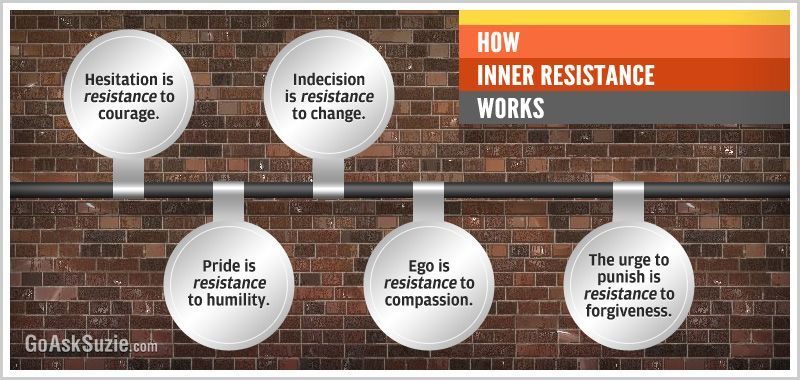
Punishment — Most of us were conditioned to believe punishment equals correction. And yet, if you look at our prison systems, you see a revolving door. This tells us that punishment isn’t necessarily corrective. Often, when you take off this mask, you realize that punishment is really resistance to forgiveness.
Hesitation — This is a second cousin to resistance. It’s marked by a sense of reluctance and unwillingness. Many people hang out in hesitation, believing it’s the same as being cautious; yet the two aren’t the same. Because often, when you take off the mask of hesitation, you realize that hesitation is resistance to courage.
Indecision — This is the attempt to find safety by avoiding decisions. People who hang out in indecision are doing so because they’re afraid to make mistakes. Therefore, if you take off the mask of indecision, you realize that indecision is resistance to change.
Pride — Pride is the throne room of the inner wall of resistance. In very subtle ways, pride tells us we are better, we are superior to, we are different from, and we are more special than others.
As long as we believe the hype, we’re disconnected from each other. But if you take off the mask of pride, you realize that pride is often resistance to humility.
Anger & Fear — Fear and anger are attached like Siamese twins. One doesn’t exist without the other.
However, anger is always a cover emotion. And when you take off the mask of anger, you realize that it’s usually just resistance to love.
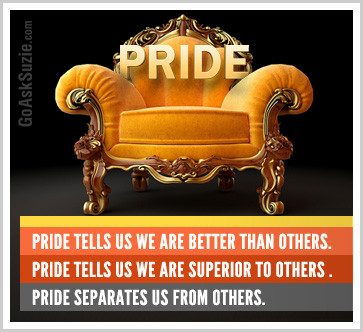
The Ego — It’s the voice that argues against, argues to reject, and argues to push away from people, life, and circumstances. Like a good lawyer, the ego is very persuasive. It uses fear as its primary witness, and it speaks the language of spite, pettiness, and attack. However, when you take the mask off, you realize that ego is just resistance to compassion.
By now, it should be fairly obvious
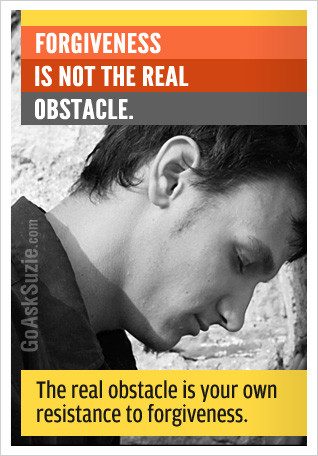
Forgiveness isn’t the real obstacle you face, the real obstacle is your own resistance to forgiveness, and that resistance hides behind many masks. The thing you should note is that your own resistance to forgiveness can’t be overcome by force. Why? Because your inner wall of resistance was designed to resist. If you try to bully, guilt, pressure, or force yourself to forgive her, you’ll only reinforce your resistance to it.
Your Mission
Your mission (in my opinion) is to quit fighting a war you don’t want to win anyway.
Think about it.
Do you really want to win the war of unforgiveness? Will it make you feel victorious to carry the flag of bitterness, hate, and hostility? If not, then it pays to discover what’s behind your inner wall of resistance and dismantle it.
Here’s the beautiful truth.
True Love is unconditional because it forgives unconditionally. It’s not about whether we’re capable of forgiving. The capacity exists within all of us. It always comes down to this: Are we willing to forgive?
Some are, while others are not.
The key difference between the two groups is found in the presence or absence of love.
This is why it’s been said that you can only forgive to the degree that you can love. In the end, Steven, it’s not a question of IF you can forgive your fiancée; it’s a question of IF you love her enough to put down your own resistance to forgiving her. And when it comes right down to it… that, my friend, is the only thing that really matters here.
Until we speak again…
Remember… Love Wins!

By the way… You can now get over 13 hours of my best Betrayed Recovery strategies.
Learn More Here





